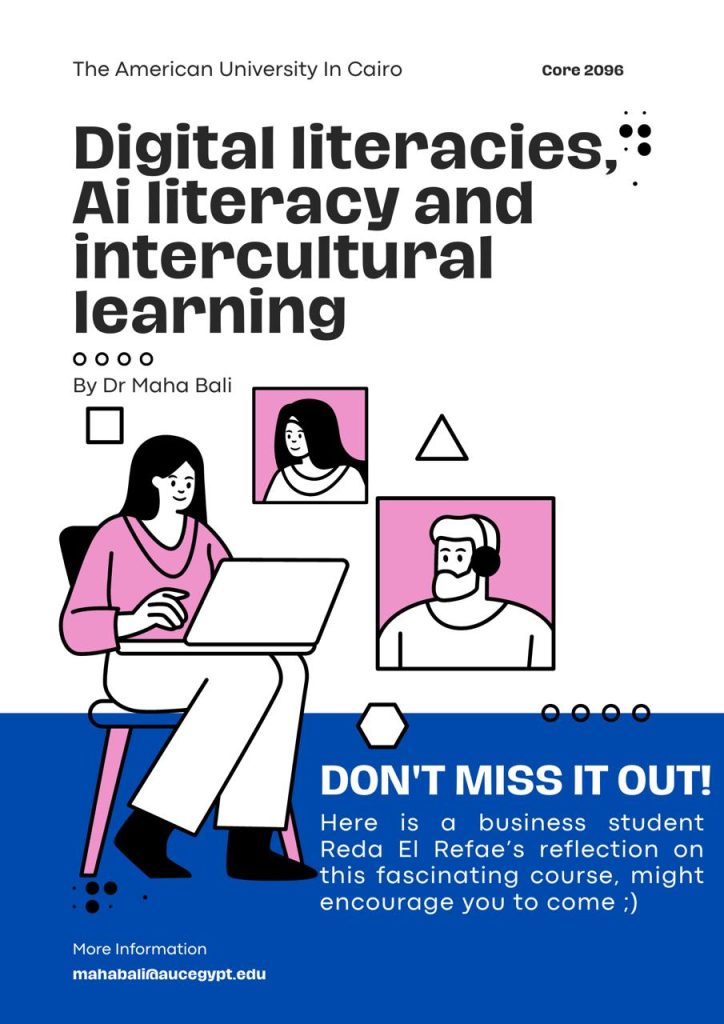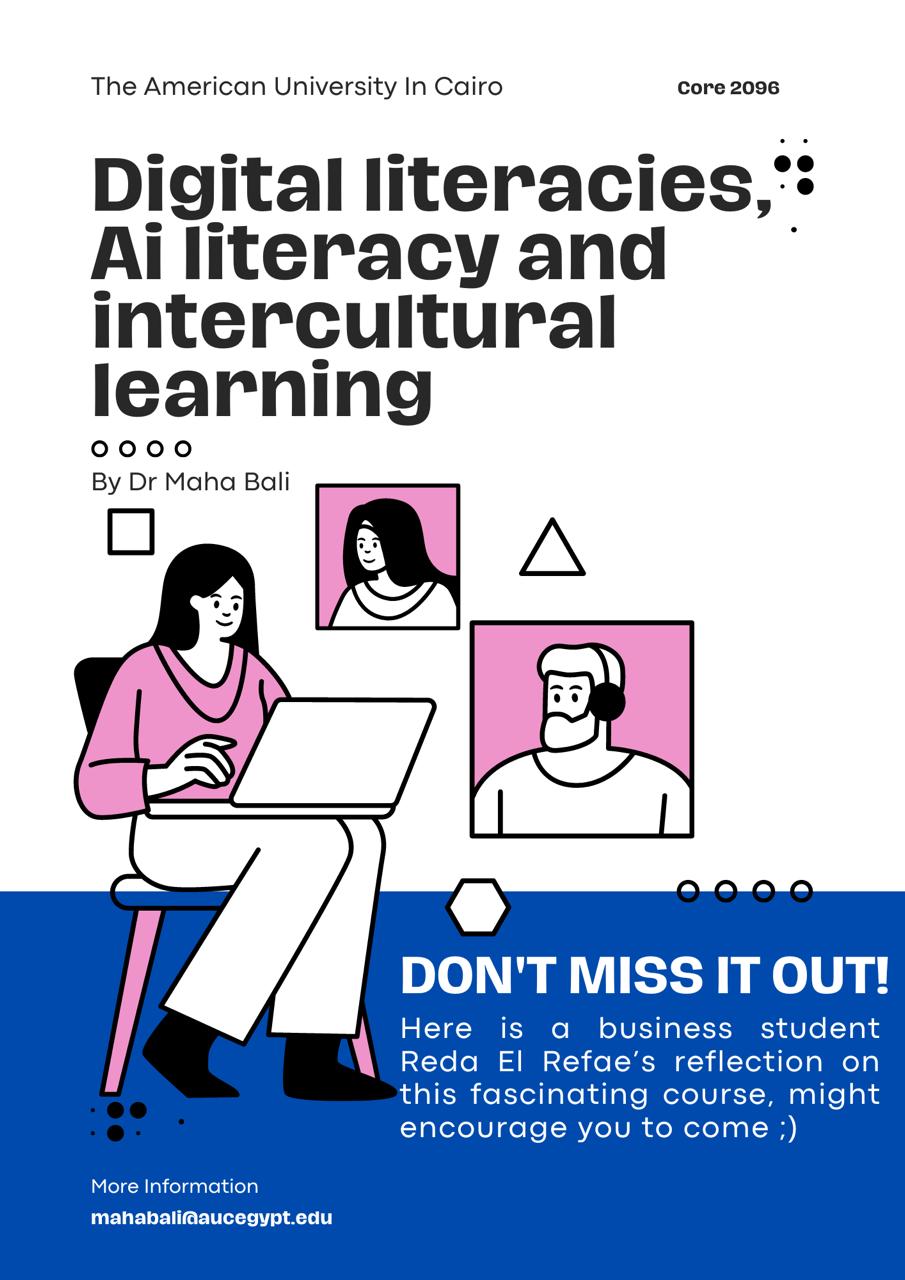Final Reflection Part 1: Reflecting on the Course

After finishing this course, I can say that it was a surprise for me to have such a spectacular course. Courses like this are rare in academic life. I did not learn only academic material but also a lot about myself and my values. I remember the very first classes at the beginning of the semester when Dr. Maha illustrated to us that she supports us and is not there to put pressure on us but rather to help us learn more. I remember when Dr. Maha showed us a video of her discussing with another instructor how teachers can make students thrive in times of trauma. At that period, one of my close friends had died because of a car accident. It was really shocking for me and overwhelming, and I did not have the energy to go to classes and meet new people. However, when the doctor showed us this video, I felt that Dr. Maha had this empathic energy that made me more connected and felt like this course was a comfortable place, which made my semester easier and more enjoyable.
In this course, I learned a lot of things about myself in several aspects such as identity, bias, skills, and values, which will benefit me in my social and career life. Several topics taught me much about my identity such as discussing what defines me, communicating with totally different people in the Soliya program, and the digital identity topics. I discovered from this course experience that identities differ from person to person, based on their personal experiences and values. Not all people have the same criteria for identity, but people choose what truly defines and values them the most. The course somehow changed my way of thinking. It made me realize my sense of identity is a unique and dynamic mixture of my experiences, values, and interactions with others, allowing me to accept and appreciate diversity. In addition, I figured out that I might be biased because of my experience or even my language, which sparked me to be more open-minded to others. The topics about bias were really beneficial for me as I did not think about my actions being to some extent biased, which was true. I learned to think more critically about why I am doing certain things in a particular way, questioning whether it is because of my bias or not. It made me more able to recognize and confront my own biases, understanding how they shape my perceptions and interactions with others. This awareness has prompted me to reflect deeply on my values, fostering me to be more authentic in my actions. This course also taught me not to be judgmental. To be honest, at the beginning of the course, I judged the class in a certain way but as time went on it proved to me that I was wrong. The course was full of things that made me more empathetic and more agreeable to people, which I think will be beneficial for my social life. The digital identity topics also highlighted the importance of creating an online presence that aligns with my true self and values while being mindful and showed me how our social fingerprint can impact others. Therefore, I learned that digital actions are as important as actions in real life.
Furthermore, I learned a lot about AI like how it works, how to prompt it effectively, and how AI can be biased in certain situations. I am taking another course about innovation in business with AI but I did not learn as much about AI as I did in this class. I got used to nearly most of the tools that use artificial intelligence. As I get familiar with them and how AI works, I can say that AI is not as complex as many are saying. It depends mainly on the data, the model, and the tokenization process. So, we can direct and tailor AI in any field or any use case as we want. I think learning this is the most vital thing that I learned this semester because AI will be the next transformative for all business and all life aspects.
If I were to showcase my learning in this course, I would use three assignments: the Narrative Game, the AI Literacy project, and the Soliya program. The Narrative Game assignment exemplifies my understanding of identity and values, allowing me to creatively present personal experiences and moral dilemmas in an engaging format that raises awareness or delivers a message. The AI Literacy project highlights the importance of digital identity and the ethical considerations surrounding technology, and it demonstrates what is AI. The Soliya program is a testament to my learning in communicating with various cultures and bias awareness. Through real-time dialogue with individuals from diverse backgrounds. These assignments collectively show the comprehensive and unique teaching of this course.
Here are the links for the assignments:
- Narrative Game:
https://forms.gle/E8KHEpy2g43H2vgP7
- AI Literacy project:
- Soliya program reflection:
https://reflect.creativitycourse.org/published/post-solyia-reflection/
If I could change some things about the course to improve it, I would change the period of the narrative game and the AI literacy assignment, and I would add one or more group projects. I would change the AI literacy assignment to be in the middle of the course so we as students could have a better understanding of AI. this will us to be more experienced with what is AI to be able to have a deeper understanding and discussion about its usage and disadvantages. Furthermore, the narrative game was great but I would push a little bit earlier to enable all students to play with each other’s games to have better feedback. Also, I would have one draft process where students should submit their game draft to be able to give them feedback to improve it in terms of content and engagement. The other thing is adding one or more group projects. I think all of my classmates understand the class material very well and each has his/her perspective, which gave very good contributions to certain tasks that were done in class. I think this will result in extraordinary projects that can enhance all of the coming students’ learning experience. In my opinion, the Solyia experience would not be beneficial if I did not have a classmate with me to support each other. So, I believe having more group projects will be beneficial for all.
I think this course is perfect for open-minded people who want to learn more about their identity, indirect bias, digital identity, digital footprint, and artificial intelligence.


Provide Feedback